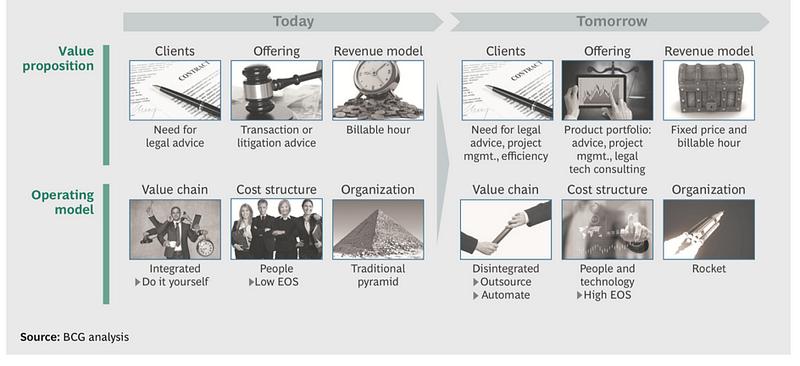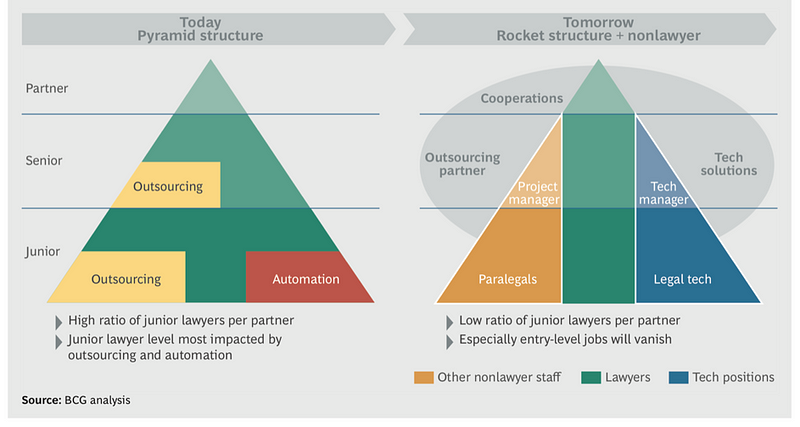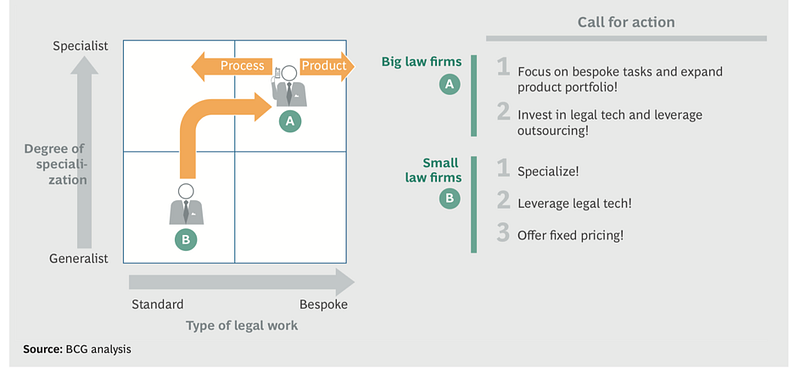by Zoë Andreae
Legal tech innovations will present numerous opportunities and threats for the legal industry and its stakeholders, especially for individual consumers, corporate legal departments, and law firms.
1. Opportunities and Threats for Individual Consumers
Legal tech innovations will increase the access to justicefor individual consumers, by providing them with more accessible, affordable and convenient legal services, many of which some consumers could formerly not afford given the traditional legal service offerings.
Online legal document services or dispute resolution platforms will provide such disruptive solutions that address the widely prevailing nonconsumption and latent demand in the German legal industry. Moreover, legal tech innovations will improve the existing information asymmetry between legal service providers and individual consumers, and will make the value creation of legal services more transparent and comprehensible for consumers.
Due to the largely existing latent demand, the ease of accessing the solutions, and the directly visible improvements in access to justice, individual consumers are leading the adoption of legal tech solutions
2. Opportunities and Threats for Corporate Legal Departments
Legal tech innovations will provide corporate legal departments with solutions to various of their resource constraints by offering opportunities for optimization, efficiency creation, costreduction, scalability, flexibility, and transparency.
Corporate legal departments will be able to standardizetasks, improve their quality and increase the delivery speed, and consequently reduce costs, by introducing legal tech solutions to their existing processes and workflows.
Whether by using legal tech tools themselves or by sourcing services from legal tech startups, such as legal process outsourcing or insourcingplatforms, the main goal for corporate legal departments will be to reach cost savings. In addition, legal process outsourcing or insourcing solutions may improve the scalability and flexibility of corporate legal departments by bridging short-term resource bottlenecks with their services, and by enabling in-house lawyers to devote their time to more strategic and higher value tasks.
Furthermore, legal analytics solutions can provide corporate legal departments with transparency of the costs associated with legal activities, and with more sophisticated selection tools for sourcing external legal services.
Corporate legal departments are likely to adopt legal tech solutions ratherquickly, as they provide them with a large variety of visibly impactful solutions to the problems that corporate legal departments are facing, such as the more-for-less challenge.
3. Opportunities and Threats for Law Firms
Legal tech innovations will provide numerous opportunities and threats for law firms.
On the one hand, legal tech innovations will present threatsto big law firms in the lower value segments. But at the same time competition from boutiquelaw firms, the Big Four and legal high-tech solutions will threaten big law firms in bespoke legal areas. Small lawfirms will face great threats of being displaced by legal tech innovations that automate and replace activities that make up the core of small law firms’ business.
On the other hand, legal tech innovations may assist law firms in achieving cost efficiencies, enhanced decision-making effectiveness, and a more scalable, flexible and adjustable workforce that are increasingly required to satisfy clients’ demands and to prevent being replaced, partially or entirely, by new types of competitors.
Typically, incumbents of the legal industry will not take disruptive entrantsand their legal tech innovations serious at first, believing that regulations will protect them from the disruptions in the long run, and will thereby cedethe low-end market to disruptors. However, as even heavily regulated industries can be subject to disruption and consequent regulatory change, no law firm can longer afford to ignore the opportunities and especially the threats that legal tech innovations provide them with.
Therefore, law firms have to reevaluate the core parts of their business model, the value proposition and the operating model, to capture the opportunities presented by legal technologies.

Big law firms may transform their organizational structure from the traditional hierarchical pyramid into a rocket, and reimagine their value proposition by not only offering legal services as such, but also assume the role of outsourcing managers or master legal-tech vendors.

Small law firms may specialize their legal services in certain legal practice areas or reduce them to a limited number of case types offered at fixed prices, and may employ enabler technologies or legal high-tech tools to support the specialization.

Whereas the adoption of legal tech solutions by law firms has not reached its full potential yet, big law firms are said to adopt legal tech solutions faster than small law firms, mainly doing so in response to the growing more-for-less pressures from corporate legal departments.
Altogether, it seems that individual consumers, corporate legal departments, as well as open-minded big law firms and boutiques will be able to captureand leverage the opportunities presented by legal tech innovations most successfully. In contrast, small, generalist legal practices are likely to face a serious risk of being disrupted and edged out of the market by legal tech startups or technology leveraging law firms.
Moreover, it is likely that in the long term the relative size and importanceof the world’s great law firms will shrink, a consolidation in the top tiers will occur and winner-take-all markets emerge, as much of the work they used to do migrates to platforms that can provide comparable services at a fraction of the cost and with far greater convenience.
Legal tech innovations will also affect other entities of the traditional legal services value network, such as law schools, prosecutors, public defenders,
court systems, and other local, state, national, and international bodies that regulate legal industries and administer justice, as well as incumbent legal software providers, and service providers to the legal industry in areas, such as office supplies and legal literature.
Collectively, legal tech startups’ legal tech innovations will reshape the German legal industry fundamentally and sustainably.
For more detailed information access the Master of Science Thesis by Zoë Andreae or reach out via LinkedIn or Email.
Sources:
Veith, C., Bandlow, M., Harnisch, M., Wenzler, H., Hartung, M., & Hartung, D. (2016). How Legal Technology Will Change the Business of Law. The Boston Consulting Group & Bucerius Law School. Retrieved from http://www.bucerius-education.de/fileadmin/content/pdf/studies_publications/Legal_Tech_Report_2016.pdf
http://www.carbonelawyer.com/wp-content/uploads/2015/03/business-lawyer.jpg
http://s1.ibtimes.com/sites/www.ibtimes.com/files/2017/02/02/gabriel-macht-harvey.JPG




